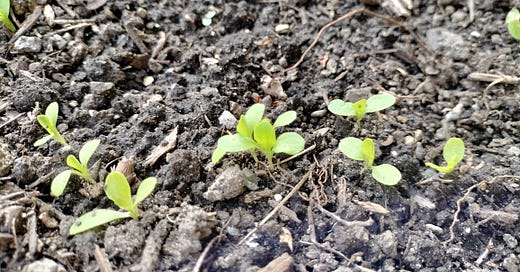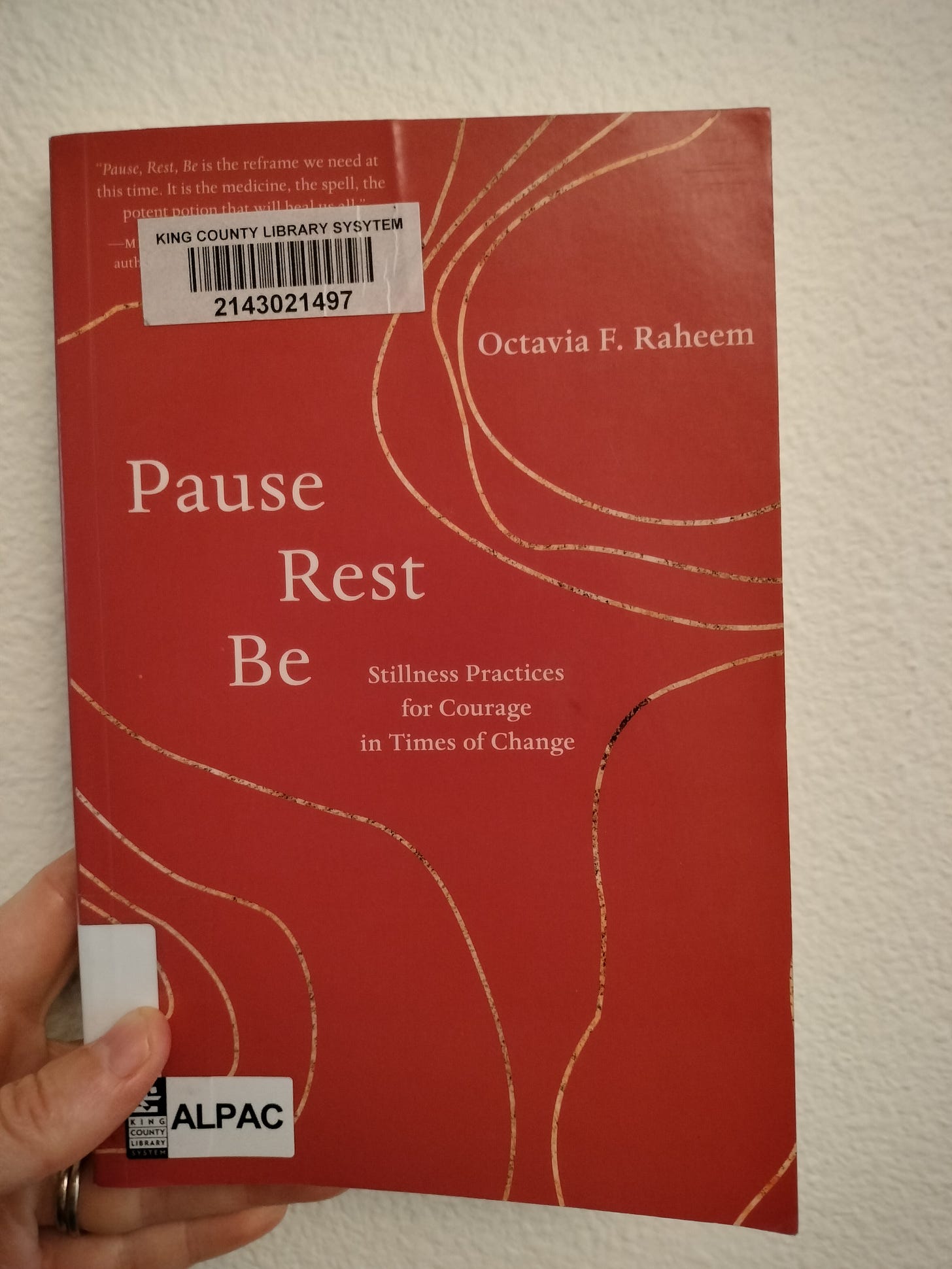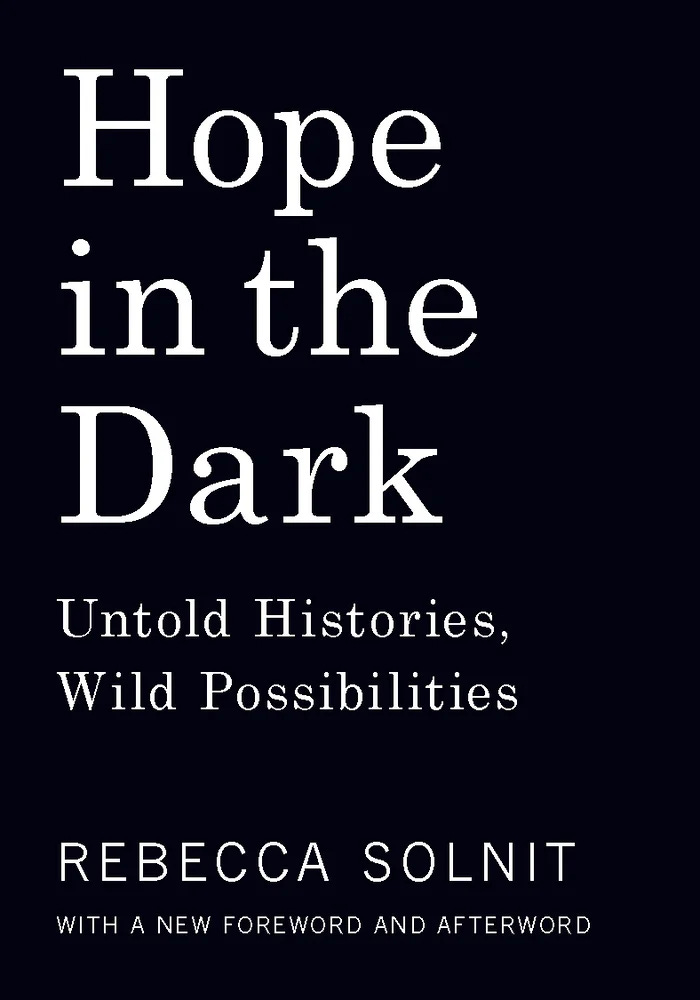Spring has sprung here in the Seattle area—hard—and I am planting seeds.
I planted sugar pea seeds that have now sprouted and stand an inch or two tall. Lettuce seeds, now unfurling their first true leaves.
Kale and spinach seeds, more recently, not yet sprouted but I feel hopeful. Sunflower and zinnia seeds that probably won’t sprout until it’s much warmer, if at all—but hey, I had to try.
Some seeds, like lettuce, I scatter and then cover with a light dusting of dirt. Others, like peas, I press an inch deep into the soil.
Each has its own way of being, its own preferences, its own shape and size. What they share in common is potential. The hope of growing, with time and nurture and patience, into something glorious.
(Yes, I do consider vegetables glorious. A blessing of approaching midlife?)
A couple years ago someone asked me, “What’s your favorite part of growing vegetables?” I said the first thing that came to mind: “Eating them.” Also an avid gardener, she laughed and said, “Me too.”
But though I love eating homegrown veggies, if I had taken more time to think about her question, I don’t know that it would have been such an easy answer. Because I also really love watching them grow. Especially in those first tender days and weeks when they’re getting noticeably bigger each day. I watch in awe and cheer them on.
Why speak of vegetable seeds in a time of crisis like the one we’re living in?
For one thing, I think gardening is one of those things that can ground us and hold us together when there are many reasons to fall apart. So many reasons.
(For those who don’t have easy access to growing plants—I think different things can ground us in different times and circumstances. I want us all to find those things that ground us and pursue them devoutly, whether it’s gardening or something else.)
I also speak of seeds because I’ve been thinking about Octavia F. Raheem’s words in Pause, Rest, Be: Stillness Practices for Courage in Times of Change. Raheem writes of a season of in-between-ness. When what we were accustomed to has been torn apart, and we do not yet know what new world will be built in its place.
This can apply to all sorts of personal life circumstances. Perhaps it also applies to this moment we’re in as a country.
So much has happened over the last almost-three months. So much has changed, and not for the better. What words of hope might we find in this time? What words of courage might we speak to one another?
Raheem writes of the in-between times:
“There is no way to apply existing logic here. There is no sense or meaning to make. There is no normal to idealize and place on a pedestal. There is only the ground you are sitting on and even that feels like it is crumbling. Sink into the ground. You are a seed.”
Sometimes there is not much to do but sink into the ground.
We’re living in a time where what we thought of as normal—which may have worked for some of us, but didn’t work at all for many—is gone. It was never ideal anyway—but that doesn’t mean that its destruction does not also cause harm.
The ground may be crumbling beneath us, or maybe it was a false and unstable ground all along and some of us are just now feeling the reality of that—either way, it’s jarring. It’s disorienting. We panic and fumble around for something stable to grasp onto.
Or, perhaps, rather than panicking, we sit and we sink. We recognize that we are seeds.
The times we’re living in might seem dark. They might be dark.
It feels worth saying that the way our dominant US culture often uses metaphors of light and darkness is tied to racist assumptions about lightness as whiteness, purity, superiority, and goodness—and darkness as blackness (or brownness), uncleanness, inferiority, and evil.
We might tie these metaphors to sexism as well, since historically women have often been associated with the moon (i.e. nighttime) and men with the sun (i.e. daytime).
For these reasons I’m not sure the metaphor of darkness is always helpful. And yet, to the extent that we do experience the time we’re living in as a dark one—perhaps, as Rebecca Solnit writes in Hope in the Dark: “The future is dark, with a darkness as much of the womb as the grave.”
Or, as Sikh activist and filmmaker Valarie Kaur put it in a prayer back in 2016: “What if this darkness is not the darkness of the tomb, but the darkness of the womb?”
When we try to look ahead, we see uncertainty, and this feels like darkness. But darkness is exactly where new seeds begin to grow.
Seeds sprout in the darkness of the soil in my garden beds, to which I’ve added aggressive amounts of compost in order to provide as many nutrients as possible. Seeds sprout in the cracks of sidewalks, miraculously.
My parents even recently sent me a photo of a tulip growing partway up a tree. (Sure, that’s a bulb, not a seed, but you get the idea.)
It’s remarkable where life can take root and thrive. These times we’re living in are no exception.
Who knows what we, like seeds, might grow into in this season? Who knows who we might become? What new courage, action, wit, compassion, and goodness the challenges of this time might call forth in us? What art we will create, what relationships we will build, what resistance we will embody, who we will help in a time of need, who will help us?
We reach for the light. We look forward to finding out.
I’ll leave you with part of a gorgeous prayer from Octavia Raheem (also from Pause, Rest, Be).
One of the things I love about being post-evangelical is that I don’t really worry anymore about the “purity” or “correctness” of people’s beliefs before being open to learning from them, receiving their wisdom, or joining in the prayers they pray.
A few years ago, a prayer addressed to the “Goddess of the space in between” probably would have freaked me out. But the God I believe in encompasses masculinity and femininity.
Drawing on biblical imagery, God created male and female (and all sorts of diversely gendered humans) in God’s own image. God is a mother hen, a mama bear, the feminine Spirit who groans and births a new creation. (More on all this in Nice Churchy Patriarchy, of course.) Goddess, then, is simply a feminine word for God.
I’m cool with that. And I hope this prayer from Raheem feels like a blessing:
“Goddess of the space in between,
We thank you for being the wild and beautiful ocean that you are…When you come and swallow us in your luminous darkness, may we have the good sense to simply lie down, float for a while, and dream. Let us dream of something new and ancient. Let us dream of nothing and everything in altering time. Let us dream of composting old things and planting seeds that will grow for generations to come. Let us dream of boundlessness even when we feel stuck and small.”
Amen.
Let us float. Let us dream.
And let our dreams not be bound by the constraints placed upon us, by the devastations of this time we’re living in. Let them burst out of dark soil like seeds and never stop growing.
In this with you.








You got my soil scientist attention! The good soil parable comes to mind too.
I had the same image a couple years ago - see if you like this poem version
https://open.substack.com/pub/iamadamah/p/conspiracy?r=21ap39&utm_medium=ios
As a gardener and hobby farmer, I love this. As a chaplain, I know this is balm for many souls! Thank you for your reflections, which I especially needed today as I woke up to snow - in New Jersey!